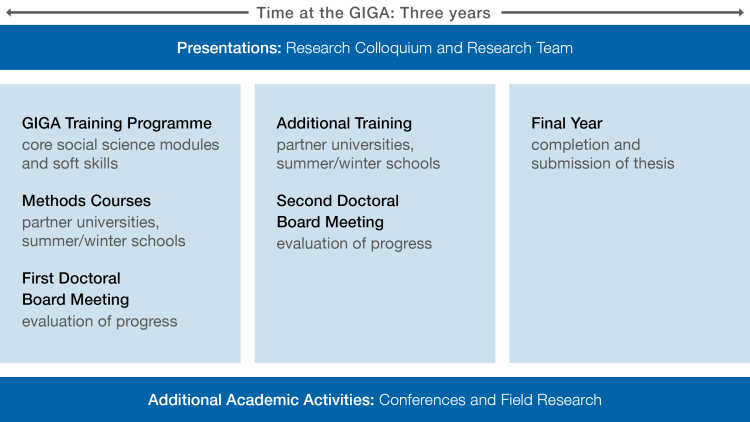- Home
- The GIGA
- GIGA Doctoral Programme
- Research, Structure, and Training
Research, Structure, and Training
Research
The GIGA is an independent research institute that conducts social-science research with real-world relevance on Africa, Asia, Latin America, and the Middle East, and on global developments. Our Doctoral Researchers are active members of the GIGA’s institutional and research life. Based on their individual thematic orientations, they are member of one regional institute and one research programme and they actively participate in the regular meetings of these research units. This institutional setting allows doctoral researchers to conduct independent research, engage in academic debates about their own and other peoples’ work, and acquire the key skills for a successful academic career. As members of the GIGA Doctoral Programme Doctoral Researchers benefit from the continuous exchange of research ideas and knowledge that takes place at the institute. Within this process they become part of different research fields and work alongside senior scholars, thus gaining experience in a variety of academic approaches and receiving support as they establish their individual profiles as independent researchers.
Structure
The GIGA Doctoral Programme is a three-year structured programme. It offers Doctoral Researchers tailored training in the form of various courses and workshops as well as different regular meeting formats where Doctoral Researchers present and discuss their work. The evaluation of progress is ensured by at least two doctoral board meetings. As a non-university research institute, the GIGA cannot award the doctoral degree but cooperates closely with different universities. Our Doctoral Researchers enroll at the university that their first supervisor is affiliated with. In accordance with the Leibniz guidelines on career development, the GIGA acknowledges that it is far more usual for a doctorate to take longer than three years; our Doctoral Researchers remain members of the Doctoral Programme and integrated into the institute's structures until their defense.

First academic year: An agreement between the Doctoral Researchers and the GIGA regulates the specific rights and obligations of both parties throughout the course of studies. In addition, Doctoral Researchers sign a supervision agreement with their supervisor ensuring that the doctoral research project is transparently organized in terms of content and timeline. In accordance with the degree regulations (Promotionsordnung) of their respective universities, Doctoral Researchers may complete their dissertation projects either as monographs or as article-based theses. During their first academic year, Doctoral Researchers should achieve a major part of the credit points by participating in the training programme and presenting their work and they have to conduct their first doctoral board meeting.
Second academic year: All Doctoral Researchers are expected to revise their timetables and have them approved by their supervisors in order to ensure that their theses are completed in draft form by the end of the third year. Doctoral Researchers are expected to conduct substantive research (including field research, if applicable) and develop a clear and detailed model to facilitate the writing of their empirical chapters or papers. By the end of the second year, Doctoral Researchers should continue to complete the required number of credit points and have passed the second doctoral board meeting.
Third academic year: All Doctoral Researchers are required to revise and complete the chapters or papers of their theses and to complete the required number of credit points. By the end of the third year, Doctoral Researchers are expected to submit their theses or collection of articles to their universities in accordance with the respective degree regulations.
Training
The GIGA Doctoral Programme offers an institutional setting that allows Doctoral Researchers to conduct independent research, engage in academic debates, and acquire key skills for a successful academic career. We seek to train talented young researchers in core social science modules as well as soft skills for them to
gain an overview and a solid understanding of social science basics and standards in order for them to develop “a common language”,
demonstrate a command and understanding of methodological approaches,
learn from the GIGA’s distinct research agenda and culture,
get the most out of the DP’s diversity in terms of mutual support and exchange, a broad social science understanding, and the proficiency to transfer specialized knowledge to different target audiences.
The GIGA training programme comprises high-quality courses taught by in-house specialists as well as experts from around the world. It consists of social science modules that are relevant to all Doctoral Researchers' projects. Soft skills seminars round off the training. In addition, Doctoral Researchers take methods courses at their universities according to their individual profiles and specializations or participate in other external courses, such as summer or winter schools. All courses fulfill ECTS standards in accordance with the degree regulations of our partner universities.
Besides the training, there are various regular meeting formats at the GIGA, in which Doctoral Researchers can present and discuss the progress of their work.